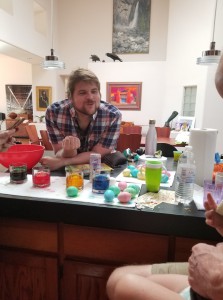Social Media Hashtags: #DailyLines, #GoTELLTheBEESThatIAmGONE, #Book9, #Noitsnotthelastone, #ProbablyTen, #PlusaPrequelAboutBrianEllenandMurtagh, #Later, #LOTSLater, #TisOneLatrThisYear, #IHope, #HappyEaster
[Excerpt from GO TELL THE BEES THAT I AM GONE, Copyright © 2019 by Diana Gabaldon]
 “Mr. Fraser was a Jacobite—do you know what that means?” Fanny nodded uncertainly.
“Mr. Fraser was a Jacobite—do you know what that means?” Fanny nodded uncertainly.
“The Jacobites were supporters of James Stuart, and fought against the king of England,” I explained. “They lost that war.” A hollow place opened under my ribs as I spoke. So few words for such a shattering of so very many lives.
“Mr. Fraser went to prison afterward; he wasn’’ able to take care of William. Lord John was his friend, and he raised William as his son, because neither of them thought that Mr. Fraser would ever be released, and Lord John thought that he would never have children of his own.” I caught the distant echo of Frank’s advice, like a spider’s whisper behind the empty hearth: Always stick to the truth, as far as possible…
“Was Lord John wounded?” Fanny asked. “In the war?”
“Wounded—oh, because he couldn’t have children, you mean? I don’t know—he was certainly wounded, though.” I’d seen his scars. I cleared my throat. “Let me tell you something, Fanny. About myself.”
Her eyes widened in curiosity. They were a soft dove-gray, gone almost black as her pupils went large in the shadows of the kitchen.
“I fought in a war, too,” I said. “Not the same war; another one, in a different country—before I met either Mr. Fraser or Lord John. I was a—healer; I took care of wounded men, and I spent a lot of time among soldiers, and in bad places.” I took a breath, fragments of those times and places coming back. I knew the memories must show on my face, and I let them.
“I’ve seen very bad things,” I said simply. “I know you have, too.”
Her chin trembled slightly and she looked away, her soft mouth drawing in on itself. I reached out slowly and touched her shoulder.
“You can say anything to me,” I said, with slight emphasis on ‘anything’. “You don’t ever have to tell me—or Mr. Fraser—anything that you don’t want to. But if there are things that you want to talk about—your sister, maybe, or anything else—you can. Anyone in the family—me, Mr. Fraser, Brianna or Mr. MacKenzie…you can tell any of us anything you need to. We won’t be shocked‐” Actually, we probably would be, I thought, but no matter. “And perhaps we can help, if you’re troubled about anything. But—”
She looked up at that, instantly alert, unsettling me a little. This child had had a lot of experience in detecting and interpreting tones of voice, probably as a matter of survival.
“But,” I repeated firmly, “not everyone who lives on the Ridge has had such experiences, and many of them have never met anyone who has. Most of them have lived in small villages in Scotland, many of them aren’t educated. They would be shocked, perhaps, if you told them very much about… where you lived. How you and your sister—”
“They’ve never met whores?” she said, and blinked. “I think some of the men must have.”
“Doubtless you’re right,” I said, trying to keep my grip on the conversation. “But it’s the women who talk.”
She nodded soberly. I could see a thought come to her; she looked away for an instant, blinked, then looked back at me, a thoughtful squint to her eyes.
“What?” I said.
“Mrs. MacDonald’s mother says you’re a witch,” she replied. “Mrs. MacDonald tried to make her stop, when she saw I was listening, but the old lady doesn’t stop talking about anything, ever, except when she’s eating.”
I’d met Janet MacDonald’s mother, Granny Campbell, once or twice, and was not overly surprised to hear this.
“I don’t suppose she’s the only one,” I said, a little tersely. “But I’m suggesting that perhaps you should be careful about what you say to people outside the family about your life in Philadelphia.”
She nodded, accepting what I’d said.
“It doesn’t matter that Granny Campbell says you’re a witch,” she said thoughtfully. “Because Mr. MacDonald is afraid of Mr. Fraser. He tried to make Granny stop talking about you,” she added, and shrugged. “Anyway, nobody’s afraid of me.”
Give them time, child, I thought, eyeing her.
Return to my official webpage for GO TELL THE BEES THAT I AM GONE for links to information and more Daily LInes (excerpts).
I first posted this excerpt (Daily Lines) on my official Facebook page on April 22, 2019.
That’s my son, author Sam Sykes, dying Easter eggs with us…
This text is copyright © 2019 by Diana Gabaldon. All Rights Reserved. You may share the link to this excerpt, but please do not copy and paste the entire text and post it elsewhere.Thank you.
-Diana
This BEES excerpt was last updated on Friday, April 26 2019, at 4:00 p.m. (PT) by Diana or Diana’s Webmistress.